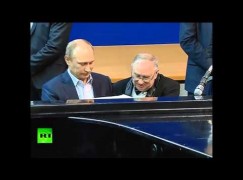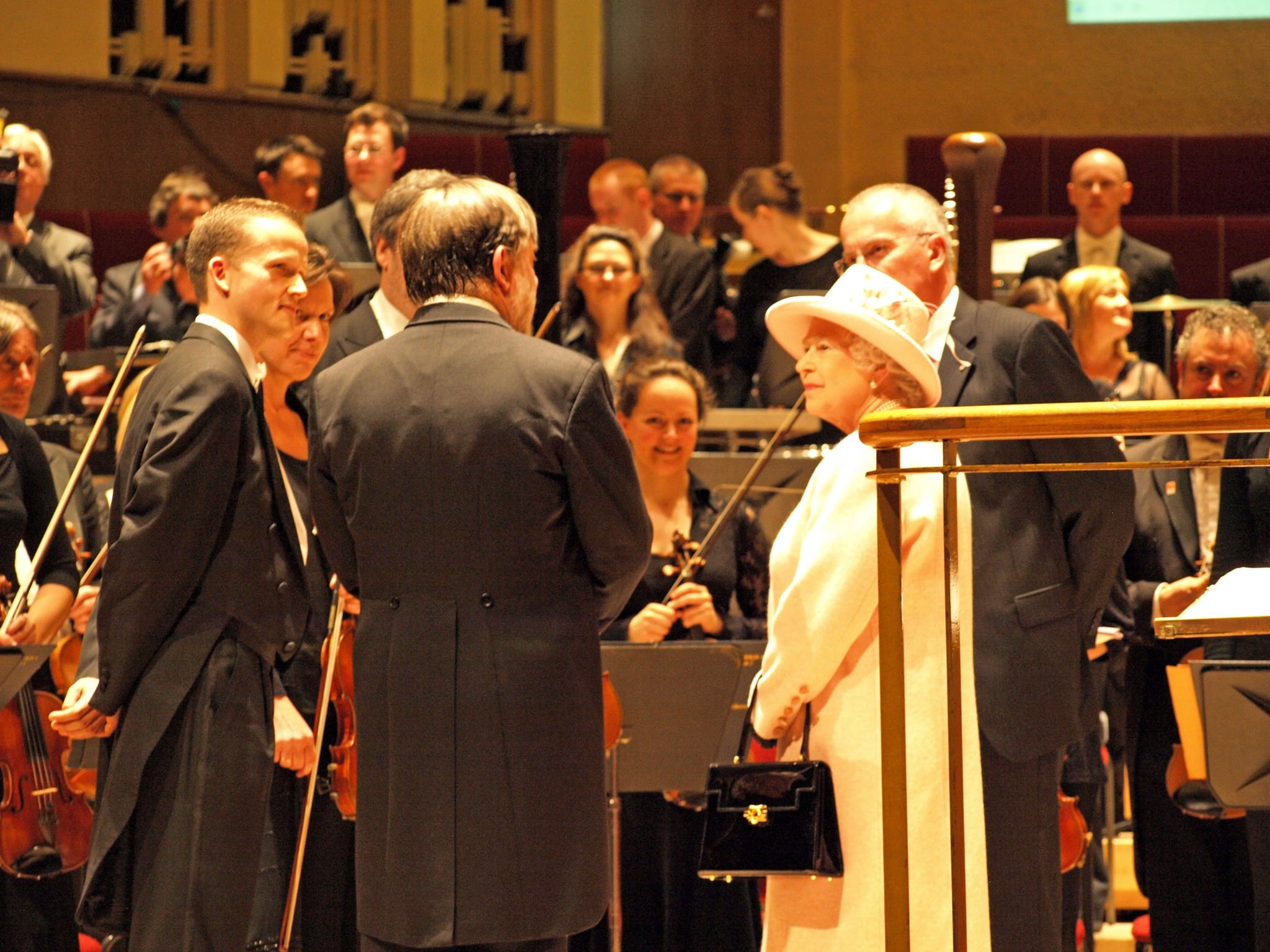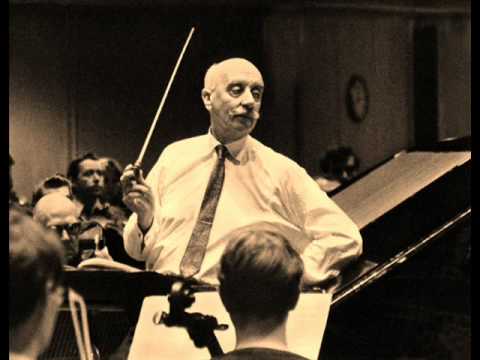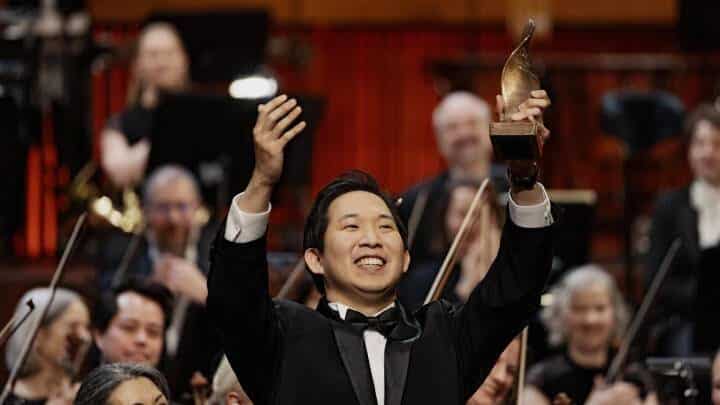Vladimir Putin: These are my classical favourites
mainThe Russian president has been talking to students about his classical tastes.
‘I always listened with pleasure and to so-called popular classical music – Bach, Beethoven, and Mozart, of course. Maybe, first of all, Mozart, for me.
‘Of our own – Rachmaninov. And Schubert/Liszt ‘Ständchen’ – wonderful, I really love this melody: Schubert in Liszt’s adaptation.’
On contemporary music: ‘Of course, it’s difficult for me to understand a composer such as Schnittke. Although he is very famous, and we are proud of him. But only a well-prepared listener understands all the variety and the depth of his works. I have not yet grown to this point, but I hope that I will continue to move in this direction.’

More on the event here.





wow who t-f cares about a dictators taste about anything?????shame on you slippeddisc….seems to me that there is a tendency for western society to move towards facism????Trump et al….bird of a feather they say….oh and what about the cries of tortured political opponents, gay activists and gay folk , is that also sweet music to their ears…
Putin is probably the best thing that happened to Russia in a very long time.
Of course the international capital is furious for him putting a stop to their desire to loot Russia and it’s huge resources. The rest is propaganda. Just look at what that scumbag of a US president, backed by that disgusting Junta behind him, did say in Poland recently, only to deepen the divide between Russia and Western Europe, to sow hatred and conflict. Divide et Impera at its worst.
That’s the reason why western media is brainwashing their steeple nonstop about evil booga-booga Russia and why people like you say such gibberish. Because Russia must be the enemy, so the US can control the world. A Europe peacefully collaborating with Russia economically would mean the end to US hegemony. The rest again is history and propaganda.
Anon, I grant you that the West has engaged in a certain amount of propaganda when it comes to Putin. I quite enjoy watching interviews with him. Easy to fall under the spell of his charisma.
However, i’m curious about the charge that 60 journalists have been killed in Russia since 1993, according to the Committee to Protect Journalists. Most of these reporters covered topics like politics, corruption, and war. Is this also propaganda?
Sure, things are far from ideal over here but there’s nothing comparable to this!
Hilary, I honestly don’t know how much of that is true, and how much is propaganda. Maybe the truth is somewhere in the middle, as most of the times.
As far as the cpj.org stats are concerned, 38 journalists in Russia were murdered since 1992. (more died in war/accident related incidents, leading to the number of 60) It is not sincere, to imply they all were murdered by involvement of the authorities somehow. Some might have been, a few cases it seems likely, but most cases it is far from clear or are straight forward murders by criminals.
I’m not saying that Putin and his regime are the ideal form of government for a western democracy. But all things considered, that country, that population, that foreign (and also domestic) vultures and rats eager to loot the country, it is possibly one of the better solutions to rule Russia like that.
Let’s not forget the billions US $ the US has poured officially and through dark channels into destabilizing Russia. Ukraine, Chechnya, Georgia, etc. etc.
Putin is no saint, but his position and political moves are to a large degree a reaction to Western/US action, not the original action as it is lied about in action-reactio reversal in most of the western media.
I believe in 1992-2000 Yeltsin was the president while putin was just a vice-mayor of St. petersburg whom nobody even knew – why do you blame those journalists deaths on putin? Also 99% of those journalists were killed in Chechnya and other islamist regions of south Russia by Jihadists – in fact majority of those killed journalists they were pro-Kremlin guys…
With the current crisis in America of trying a coup against Trump by launching a reckless propaganda war against Russia based only on the thinnest of circumstantial evidence we need music more than ever.
No one will survive a nuclear war the MS media and irresponsible congressman are hurtling us towards.
Putin is a thug, but not some irrational monster that just wants to invade everyone else (I currently respect him more than much of our current “democratic” representatives ). If it wasn’t for NATOs expansion eastward right up to Russias border, Russia wouldn’t have annexed Crimea and intervened in Ukraine. All the military build up is on russias border, not on the Canadian border.
” why do you blame?” …I’m posing a question , not delivering blame. Genuinely curious about the responses.
You got it exactly backwards. If it wasn’t for NATO’s “expansion” eastward, Russia would have already annexed more than just Crimea and intervened in more places than just Ukraine.
That is propagandistic nonsense and not backed by any real world event, doctrine or strategy.
But to the contrary the US doctrine to isolate, neutralize and control Russia is known and can be seen played out manifold.
And – procedural unlawfulness of annexation aside – the Crimea is Russian and the population there wants to belong to Russia, overwhelmingly. Case closed.
That case is closed only for those whose mind is. It certainly isn’t for Putin, and events of this month prove this once again beyond any reasonable doubt. Those of us who know the country and its people from personal experience can see it very clearly. But you do deserve credit for “procedural unlawfulness” – a sleek euphemism for stealing.
Haters gonna hate.
Agreed fully, though it is not an argument and has absolutely nothing to do with this discussion.
It has, since obviously a rational discussion with you can not be had, since you are overcome with hatred toward anything Russian. You are not alone with this destructive personal trait.
You obviously have no idea what my feelings toward Russia are, so your ridiculous assumption is downright laughable to me and people who know me. As for my opinions, they are based on my own life experience and that of my many friends and acquaintances, in addition to my frequent perusal of various independent sources including several Russian-language media outlets that are still being allowed to exist online.
Perceptive comments from Putin, especially regarding contemporary music. ie. he doesn’t understand it, but not an outright dismissal. Interesting that he prefers Rachmaninov over Tchaikovsky, or Shostakovich.
It is the masochism of Rachmaninoff that he likes, the Russian indulgence in the feeling that everything is lost (Soviet Union’s greatness) and in the same time, enjoying it to bits (turning Russia into a dictatorship).
Masochism in Rachmaninoff? That’s a rejected dissertation right there.
Masochism is deriving pleasure from pain, and R’s music is full of it. It is a well-known Russian cultural affliction. The pieces in which R overcame such indulgence, are his master pieces: the 1st movement of his 3rd concerto (after which he jumps into the pit again), the Paganini Variations, the Symphonic Dances. In spite of his masochism he was a master, of course.
You are mistaking masochism with Nostalgia of the expat me thinks here.
Is that so? His 1st & 2nd & 3rd pf concerto and everything up till and including his 2nd symphony (sinking in pleasant worrying) and his notorious Prelude in Cis and his masterful 2nd pf sonata are all from pre-emigration time.
All of Rachmaninoff’s major works pass through a variety of moods including the ecstatic, joyous, serene, and exultant–as do Elgar’s and Mahler’s, two composers who are also accused of self-pity/masochism with tiresome regularity.
Still not to be simplified as masochism. More like the full spectrum of human emotions. Including the dark side, a side the western world increasingly has collectively stigmatized as a taboo. Our loss and neurosis, not Rachmaninov’s fault.
Agree with you re nostalgia vs masochism. Nostalgia includes that for our real or idealized childhood and/or youth, and there was as much disruption and loss in R’s early life as later.
OK maybe it’s nostaliga rather than masochism, and not everywhere in the music, but the ‘nostalgia’ has always a tinge of insincerity about it, to my feeling, a stuffy perfume of decadent and passive indulgence. You find it also generously in Tchaikovsky.
Don’t forget that a few years ago he tried to convince Rachmaninov’s heirs to sell his Swiss villa to Russia. Also tried to get them to ship the old boy’s body back to Russia.
Go figure. Rachmaninoff was a favourite (if not the favourite) composer of the American ultra-conservative Ayn Rand (born in Russia as Alisa Zinov’yevna Rosenbaum). She deemed Rachmaninoff superior to Bach, Mozart and Beethoven. Now, Putin, regarded by most outside Russia as a brutal, corrupt and opportunistic dictator, says he’s a fan of SVR. The late romanticism and heart-on-sleeve nature of the composer’s music hardly seems to fit the mind-set of either.
Maybe she had been impressed by the movie Brief Encounter a bit too much.
Meanwhile maybe hardly would she have grasped that without Bach, Mozart, Beethoven and the generation of Romanticists after that Rachmaninov would have been a clueless composer.
Ayn Rand can not be categorized as conservative or even ultra-…
She was an ultra-neoliberal.
(liberal in it’s real meaning, not the wrong one the Americans are used to, mistaking left/socialist with liberal)
She is a tragic figure, and even more tragic are her followers (e.g. Alan Greenspan) and the destruction they brought over the world, since she probably was nothing but a disturbed person with an extreme narcissistic personality disorder. She was the ideological counterpart of Mao Tze Dong in the capitalistic world.
I should add that there’s an intensely Russian flavour to Schubert/Liszt as performed by Horowitz. A canny choice to say the least.
I must say the very mannered playing of Horowitz increasingly annoys me. Is this how Liszt envisaged his transcription?
I hazard a guess that he probably envisaged many ways of executing the transcription (hence the nonsense of talking about definitive performances) , and Horowitz is within the parameters. Pogorelich in more recent years slips outside the parameters of what a composer envisages.
What are those parameters, exactly?
For instance, the opening of Rachmaninov’s 2nd Piano Concerto is marked minim=66.
Rubenstein is a shade slower at minim=60.
Pogorelich, on the other hand is minim=30.
The latter is outside the parameter as he has completely altered the character and intention of the music. It’s more like a transcription, or re-composition.
Dang, I never asked him.
Let us see the hard facts: Vladimir Putin is ’kulturny’, he supports Culture, he seems to have a good cultural reference background, this reportage shows an average personal taste for music compared to SD readers and a cautiously positive attitude vis-à-vis modern music. Most Western leaders are ’niet kulturny’.
Merkel is very ‘kulturny’.
But you are right, more an exception than the norm.
Stalin loved Mozart, and Hitler loved Bruckner, Wagner and Franz von suppé. It does not follow automatically that those people really understood classical music, because we don’t know what it was that they liked, and considering their deeds, it appears that their sensitivities were quite mixed-up. Napoleon, another killer, did not have much interest in music but he loved Goethe’s early novel ‘Werther’ which is all about love sickness, nostalgia, and suicidal Weltschmerz, and nothing of the kind did drip into his politics. We know of stories of concentration camp brutes who shot Jews from the trees in the afternoon and wept over a Schubert song at a recital in the evening. So, expressing interest in culture in general and classical music in particular is in itself no garantee for understanding the humanistic implications of the art form.
“Hitler loved Von Suppé” … more gossip worthy (and therefore relevant to SD) he loved Lehar. Lehar’s wife, and many associations were Jewish. All concerned were spared the racial laws due to Hitler’s fixation on “The Merry Widow”.
Yes, it was Léhar…. got mixed-up.
Mr/Mrs Anon, Mr Borstlap,
Thank you for your comments.
Yes, Angela Merkel seems to be a cultivated person with interest in classical music and opera. Even Mr Macron plays the piano, and he probably knows his Proust. They seem to be exceptions. As for their interest not implying an ‘understanding of the humanistic implications of the art form’ as a corollary, there is no one-way ‘humanistic’ implication: listening to Luigi Nono’s composition Ricorda cosa ti hanno fatto in Auschwitz can drive a sensible person to tears, even those who do not appreciate Sonic Art, but it could also be pure ecstasy for some sadistic nazi guy. The ‘humanistic implications’ of High Culture are very, very individual. Even the ‘humanistic’ meaning of an art work can become very different fon the artists intentions (I really do not think that Beethoven would endorse everything people has done with his setting of the Ode an die Freude, but that’s another story). But I still appreciate official support for High Culture, no matter if it comes from Mr Putin.
I don’t think European music lovers would appreciate a much better supported classical music culture if this would be enjoyed within a continent entirely subjected by the Russians and turned into a dictatorship, with all the assets skimmed and sent to Moscow, freedom gone, free speech gone, etc. etc. We see in history that an interest in high art often serves to give a barbarious regime a legitime veneer.
Julius II was a horrible pope who was responsible for thousands of deaths in the battlefields, suffering and loting of the subjected state-cities, etc. He also sponsored the Sistine Chapel and some of Michelangelo’s best sculptures. He is dead. Of his military and political victories nothing stands. The Sistine Chapel is wonderful. Let us avoid being conquered by the Russians, but let us follow their example concerning sponsoring of High Culture.
Yes, but in the Italian Renaissance the idea of human rights, or equality before the law, freedom of speech etc. – all those modern post-1789 concepts of a more or less civilized society did not exist, only the Christian values which tried to compensate for man’s primitive urges and we know they were not always very effective, especially not in the case of papacies. The idea that art, and especially the best of it, meant ‘glory’ – for the maker and for the patron and immortality for both – was deeply ingrained in the minds of every more or less educated person – in a time when there was no general education, no internet, no TV, no jets, not even telephone. One is perplexed about the contrast between modern accessibility and information availability and the general contempt for art, let alone high art. The main cause seems to me the emancipation of the masses over more than 100 years without an accompanying civilizational narrative, but with an accompaniment of bloody wars and upheavels.
As much as I distrust Putin, and tend to dislike him, I must admit that he is honest and although the text is limit, it shows some independent thinking. I wonder how far Trump would get. Or in fact Theresa May. Very Lynn? And Land of Hope and Glory, not knowing that that is from an Elgar piece named a march, probably. Rule Britannia and Halleluja, and that’s it? Or is she another Condoleezza Rice, or another Mark Rutte, both skilled pianists, Rutte in fact having considered a professional career? The fact that Putin mentions Schnittke at all is telling, and he frankly admits that he can only listen to him with a manual.
Funny that he chooses Rachmaninov, who was a Russian runaway, over Prokofiev. But yes Rachmaninov is the more accessible, know via American films unlike Prokofiev who was known through Russian films.
The comments made me like him a bit more for some moments.
And yes he is a supporter of the arts and sees them as a means to ‘make Russia great again’, in fields where Russia always has been greet. Even here he manages to introduce corruption, through his cellist friend who also figures as a whitewasher for money laundering. And why should this news not be in Norman Lebrecht’s blog?
“Bruckner is my absolute favorite. He’s a fellow Austrian. I’d love it if the slow movement of the 7th symphony were played at my funeral. I also adore Wagner, especially Meistersinger, which I’d urge every citizen to hear and see at Bayreuth. I’ve been a Wagnerian since I was a teen. Not so keen on ‘modern’ music, it’s degenerate stuff.”
He didn’t like Karajan though.
Personally, I like the slow movement of Bruckner No.6 just as much. Please give it a try,
Yea, and the Nazis loved Beethoven, especially the 9th, All shall live as brothers, as long as they are arian !. So what ?
Godwin’s law. Nothing has any meaning, because a Nazi said or did it too.
Every year on Hitler’s birthday German orchestras presented Beethoven’s 9th to
mark the day of day’s. Not Bruckner or Wagner or Strauss or Pfitzner, but Beethoven. Just as the standard rep. in the Nazi years was essentially what it is
today in most orchestras, regardless of country, of course, with a few exceptions.
But not many.
Stupidity and bad conscience are following good and bad intentions everywhere like a shadow. Beethoven himself had a warm heart to all of humanity except his housekeepers. But that deos not diminish the meaning of the 9th.
Tchaikovsky is not on Putin’s list because he was gay…